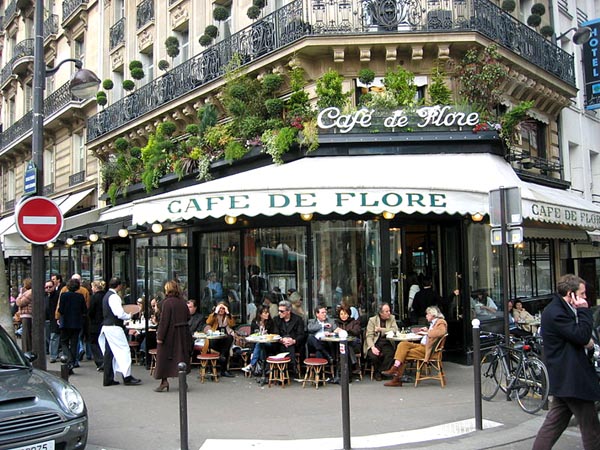 |
| A café in Paris (Wikipedia) |
Note: In Lessons #01-116 to #01-120, we're looking at French expressions used in English--not the many "borrow words," but "pure French."
Get Ready: Have you ever drunk a café au lait, or had your pie a la mode?
If a British schoolboy (or girl) learns only one date, it's likely to be 1066: the year that England was conquered by the French.
In October of that year, at the Battle of Hastings, King William of France defeated the English under King Harold, earning the title "William the Conqueror."
At the time, the English were speaking a language that few English-speakers today can understand. Often called "Anglo-Saxon," it was closer to modern German than English. In the nearly-1000 years since, that Germanic base has been added to by many languages (including Latin, Greek, and even some Chinese!), but mostly by the French of the conquerors.
This is one reason English has so many synonyms (words with the same meaning), such as "wagon" (from German) and "carriage" (from French); "man" (from German) and "human" (from French); and so on.
You can't imagine how many of the words we use everyday are French in origin. If I say you are adroit (skillful) or that someone is a liaison (a kind of go-between), you may not realize that I'm using words of French origin. Other words, like cliché (an overused expression), exposé (exposure of a scandal), or extraordinaire (extraordinary) retain something of their "French-ness," but have become fairly standard English.
However, in the next few columns, I want to look at words and expressions that are still nearly 100% French. When we tell someone "Bonjour!" (good day=hello) or "Au revoir!" (until [I] see [you] again=goodbye), we know we are speaking French.
But if we say, "Meet me at the café," do we think it's French? I don't. However, if we order a café au lait at the café--now that's French!
There are also some very French-sounding expressions that have completely changed their meanings in English. If, at the café, I order piece of pie a la mode, what would a French person understand? Why, she might wonder, am I ordering "fashionable" pie? But in the U.S., "a la mode" means "with ice cream."
And some of our so-called "French" expressions aren't quite right. Take for example, double entendre, meaning "double meaning." In fact, "entendre" means hear and, archaically, understand. In fact, the proper French for "double meaning" is double sens or, perhaps, double entente.
Likewise, the term maitre d' (headwaiter) is a little broken. Notice the apostrophe after the "d"? It means this was shortened from maitre d'hotel, "master of the hotel." Now it's just "master of"!
Next time we'll start looking at some real French commonly used in English. Au revoir!
--------Read more: https://en.wikipedia.org/wiki/Glossary_of_French_expressions_in_English
Practice: Match the French words to their meaning in English:
- a la mode
- adroit
- Au revoir!
- Bonjour!
- café
- café au lait
- cliché
- double entendre
- liaison
- maitre d'
- with ice cream on top
- an overused expression
- coffee with milk
- a coffee shop
- skillful
- the headwaiter
- hello
- a go-between; a coordinator
- goodbye
- something that can be understood two ways
Answers are in the first comment below.
Submitted to the Shenzhen Daily for June 2, 2008
Some of the words in this lesson received 326 visits (and another 173 visits on a re-post) on my old site between June, 2012, and August, 2021.


Answers to the Practice: 1. a; 2. e; 3. i; 4. g; 5. d; 6. c; 7. b; 8. j; 9. h; 10. f
ReplyDelete